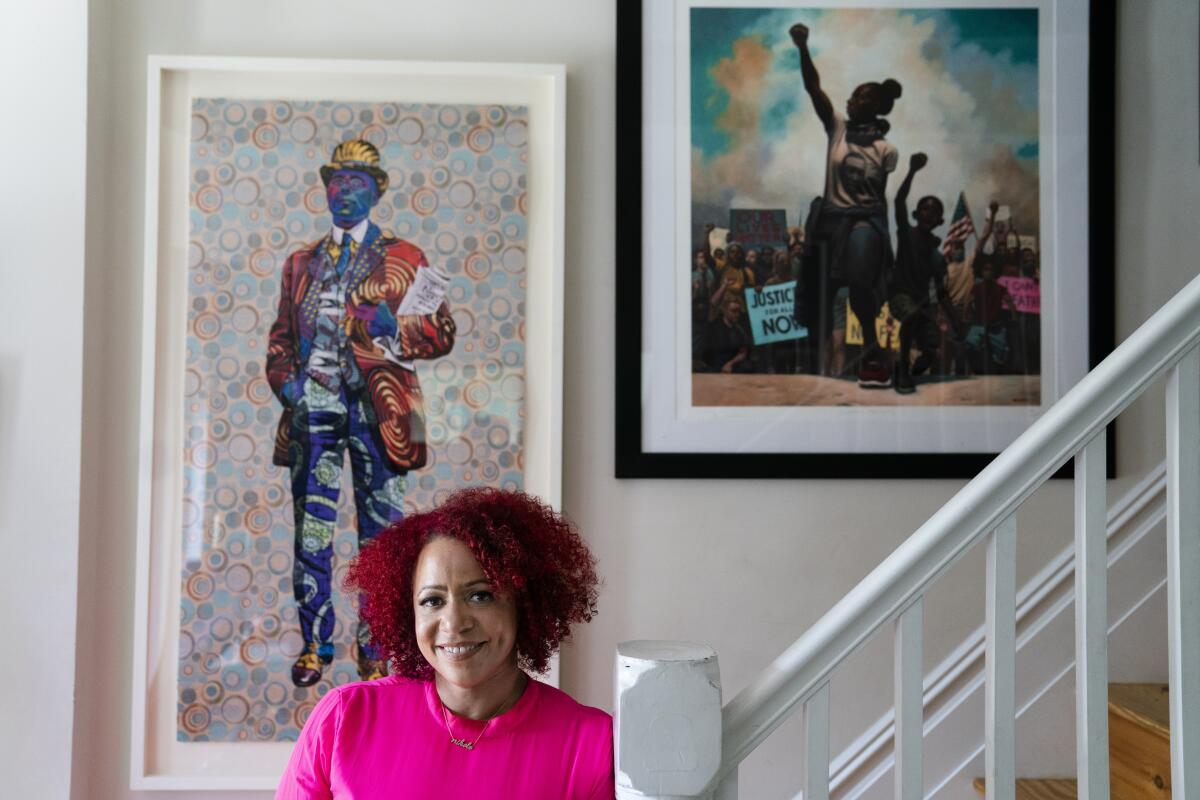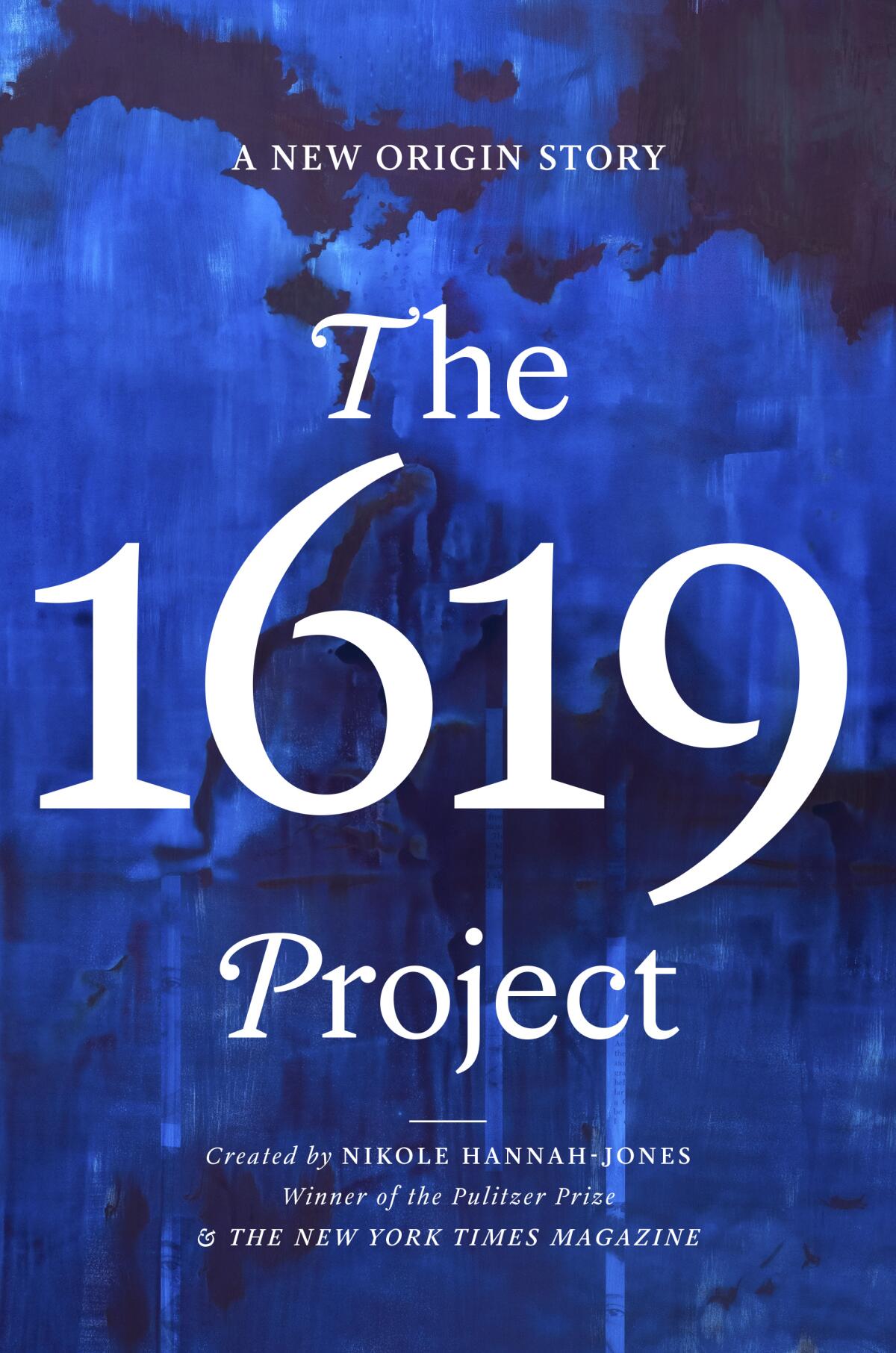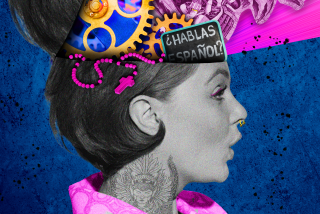Nikole Hannah-Jones became a political target. What she’s learned from the ‘hurtful’ attacks

Nikole Hannah-Jones understands power.
How it is nurtured, how it protects itself and most importantly, how not to give it away. Unfortunately, lessons about power are rarely pleasurable.
There is a cost. It can hurt. Burn. Sometimes scar. One reason Hannah-Jones understands power so well is because she has had her fair share of public run-ins with it from the moment “The 1619 Project” series was published in the New York Times Magazine. But through it all — targeted by the White House, second-guessed by historians, denied tenure at her alma mater — what has become clear is her detractors did not consider this: Hannah-Jones has power of her own.
“Who would think that a single work of journalism would become a Republican talking point, would be in Donald Trump’s impeachment trial, would be named in legislation across the country?” Hannah-Jones said. “All of that has been very weird. But of course — and I think a lot of things led to the moment that we’re in — 1619 certainly played a role.”
But let’s be clear: “The 1619 Project” is more than a single work of journalism. This month the 2019 magazine series has grown into an anthology, “The 1619 Project: A New Origin Story,” an expanded collection of essays along with photos, poems and short stories. The current voices curated — sociologists, historians, novelists — are among the most respected in their fields while the overall collection masterfully avoids reading like a disjointed textbook. There is connective tissue here. Soul. Heart. All seamlessly coming together to form a very familiar story with an unfamiliar main character.

“The 1619 Project” series challenged and in many ways changed America. The National Education Assn. sent copies to educators. Rebuttal books were published. President Trump signed an executive order in response, for heaven’s sake. All because on the 400th anniversary of the first enslaved Africans landing on colonial Virginia shores, Hannah-Jones dared to place the institution of slavery — as well as the policies and cultural practices that followed — at the core of, as opposed to a footnote in, American history. “The 1619 Project” tells the country what it has tried to run away from: “In August of 1619, a ship … carried more than 20 enslaved Africans, who were sold to the colonists. No aspect of the country that would be formed here has been untouched by the years of slavery that followed.”
By exploring subjects such as the creation of Wall Street and the motives for the American Revolution, “The 1619 Project” doesn’t rewrite our history, it completes it. Hannah-Jones, an investigative reporter who won a Pulitzer Prize in 2020 for the project, also is working on a 1619 documentary for Hulu.
On Nov. 30 she joins L.A. Times Executive Editor Kevin Merida in Los Angeles for a community discussion presented by the L.A. Times Book Club and Ideas Exchange.
“The last two years I have become a symbol, whether a symbol for people who like me and respect my work or a symbol for people who revile me and hate my work, and that’s been a really hard adjustment for me to make,” Hannah-Jones said. “I have to be careful of everything that I say in a public sphere.”
That’s an understatement. Republicans are using “The 1619 Project,” along with critical race theory (CRT), to scare white parents into thinking little Jimmy is reading “So You Want to Be a Marxist” in school. Of course an argument can be made that the tactic is successful: CRT was a factor in Virginia’s recent election of a Republican governor. In any case, it isn’t going away anytime soon.
“I think most Black Americans are ambivalent about political parties,“ Hannah-Jones said. “They just know one party is actively trying to legislate against their rights. And so they have to stick with the party that might not be doing much for them but at least isn’t trying to peel back their legal citizenship rights or take away their right to vote.”
The original series, she said, helped shape how many Democrats talked about policy going into the 2020 election, particularly on the issue of reparations, which she said historically had been a “fringe issue.”
“I think that social justice efforts, the protest movement, and ‘The 1619 Project,’ which really connected modern American equality to the legacy of slavery, was part of what helped push the Democrats to talk about more progressive policies,” she said. “But the legacy of 1619 is also very clear: that when either white progressives start to feel that they are losing the little power that they have, or that they need to unify in order to pass policy, the first thing that goes is issues of Black concern.”
Indeed, while Black people will benefit from the passage of President Biden’s bipartisan infrastructure bill, the issues activists say the Black community wants to see change on the most — voting rights and police reform — aren’t going anywhere. The frustrations with Black issues being placed on the back burner are well detailed in the new anthology.
For example, in the essay “Punishment,” Bryan Stevenson writes, “Formal slavery may have ended in 1865 but the social, legal, economic, and political system built in the South to sustain slavery survived by evolving into new forms. Laws governing slavery were replaced with laws governing free Black people, making the criminal legal system central to new strategies.” Stevenson also points out that this practice wasn’t just in the South, noting the slogan of the 1868 Democratic National Convention was “This Is a White Man’s Country: Let White Men Rule.”
During the 2020 protests, Hannah-Jones said, she was encouraged by polls that showed more white Americans were “understanding that racial inequality was not just about individuals who weren’t taking advantage of opportunities, that there was something more embedded in our country.” But not long after came the fallout from the 2020 election, followed by the Jan. 6 Capitol attack. Has the pendulum swung the other way? “To see attacks on ‘The 1619 Project’ and this idea that racial reckoning has gone too far and now white people are the ones suffering is the most predictable thing in the world if you understand American history,” she said.
For the record:
5:07 p.m. Nov. 15, 2021An earlier version of this article referred to Nikole Hannah-Jones as Hannah-Smith in one instance.
Perhaps that is why when news broke that the University of North Carolina at Chapel Hill didn’t grant Hannah-Jones tenure in large part because conservative donor Walter Hussman opposed it, the journalist fought back. And after the UNC board of trustees belatedly reversed course after public ridicule, Hannah-Jones turned them down and took a tenured position with Howard University instead.
“I have learned that power doesn’t flash what it’s going to do,” she said. “It doesn’t signal what it’s going to do. It moves silently behind the scenes and makes impact and then once everything is figured out announces itself.”
She is not boasting when she speaks of power. Her voice is strong but it is buoyed by resolve, not arrogance. Perhaps she is thinking about what it took to learn those lessons about power. Or perhaps she is thinking about the lessons she’s given.
“What I went through with the University of North Carolina, what I’ve gone through with the attacks on my career, it’s not enjoyable. It can be hurtful. But it’s nothing, right? My life is great compared to so many people.
“I was able to study power and exercise power in a way that is very rare for someone who comes from a place where I come from. I do feel empowered and I’m very aware that anything could happen and I could suddenly not be empowered. But I was very determined to use all of the lessons I have learned and being in these institutions and understanding how power works to try to use them in this circumstance. And I’m good, because I know that I’ve never sold myself out to get where I am.”
Book Club: Nikole Hannah-Jones
What: Nikole Hannah-Jones discusses “The 1619 Project” with Executive Editor Kevin Merida at an event hosted by the L.A. Times Book Club and Ideas Exchange.
When: 7 p.m. Pacific Nov. 30
Where: In-person event at the California African American Museum at Exposition Park. Get tickets at Eventbrite.
Info: latimes.com/bookclub
More to Read
Sign up for our Book Club newsletter
Get the latest news, events and more from the Los Angeles Times Book Club, and help us get L.A. reading and talking.
You may occasionally receive promotional content from the Los Angeles Times.







